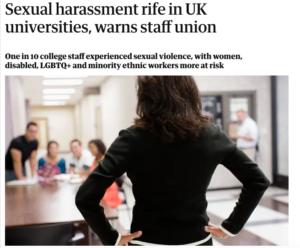Sexual Harassment in Higher Education
18th May 2022

Marshalls have developed a brand new e-learning course about Sexual Harassment, and currently is the only one that is specifically designed for universities. In the UK, One in 10 college staff experienced sexual violence, with women, disabled, LGBTQ+ and minority ethnic workers more at risk of being victims of sexual violence. Taken from this article, Jo Grady, UCU general secretary, said there are “cultural problems” within universities as a result of reluctance to discipline perpetrators for fear of damaging the reputation of these institutes, especially where these are star academics who bring in large amounts of research funding. There must be a zero tolerance approach to this kind of behaviour.

The sector is desperate for solutions, so we’ve developed a brand new course on it which builds on the work we have done in that area already. Although we don’t expect this to get rid of the issue, we hope that is can be used as a tool to identify when it is taking place and offer guidance on how to deal with these issues. Fiona McGregor, an expert in university development, helped us put the course together – we asked her a few questions about the importance of the course:
How do you think this e-learning course will be beneficial in the Higher Education sector?
Although universities have made great strides in addressing issues of harassment, we need to ensure we remain alert to the issue. It has not gone away. All colleagues need to be alert and take pro active and measures to prevent harassment from occurring. The more colleagues are aware of what constitutes unacceptable behaviour, the more confident they will be to help to notice, intervene and support colleagues, fostering a zero tolerance approach to unacceptable behaviour.
Why do you think Higher Education needs a stand alone version of this topic?
Although not unique in being large and complex organisations, the structures within HE, including the interactions of different staff groups, the structures of departments, Schools and Faculties, together with the hierarchies within them, can foster micro cultures where power disparities can make raising concerns about harassment difficult.
What are some key things/one key thing that you would want someone to take away from this course?
The importance of noticing how others are being treated, to act as an ally and an active bystander. The importance of pro active intervention.
To find out more, please drop us an email at contactus@marshallacm.co.uk

